must,can,may表示“推测”的用法
英语情态动词can、may、must的用法
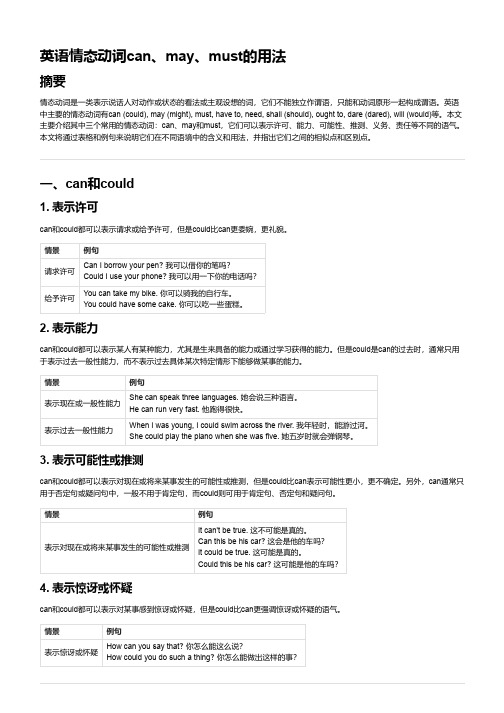
英语情态动词can、may、must的用法摘要情态动词是一类表示说话人对动作或状态的看法或主观设想的词,它们不能独立作谓语,只能和动词原形一起构成谓语。
英语中主要的情态动词有can (could), may (might), must, have to, need, shall (should), ought to, dare (dared), will (would)等。
本文主要介绍其中三个常用的情态动词:can、may和must,它们可以表示许可、能力、可能性、推测、义务、责任等不同的语气。
本文将通过表格和例句来说明它们在不同语境中的含义和用法,并指出它们之间的相似点和区别点。
一、can和could1. 表示许可can和could都可以表示请求或给予许可,但是could比can更委婉,更礼貌。
情景例句请求许可Can I borrow your pen? 我可以借你的笔吗?Could I use your phone? 我可以用一下你的电话吗?给予许可You can take my bike. 你可以骑我的自行车。
You could have some cake. 你可以吃一些蛋糕。
2. 表示能力can和could都可以表示某人有某种能力,尤其是生来具备的能力或通过学习获得的能力。
但是could是can的过去时,通常只用于表示过去一般性能力,而不表示过去具体某次特定情形下能够做某事的能力。
情景例句表示现在或一般性能力She can speak three languages. 她会说三种语言。
He can run very fast. 他跑得很快。
表示过去一般性能力When I was young, I could swim across the river. 我年轻时,能游过河。
She could play the piano when she was five. 她五岁时就会弹钢琴。
3. 表示可能性或推测can和could都可以表示对现在或将来某事发生的可能性或推测,但是could比can表示可能性更小,更不确定。
表示推测的情态动词的用法归纳
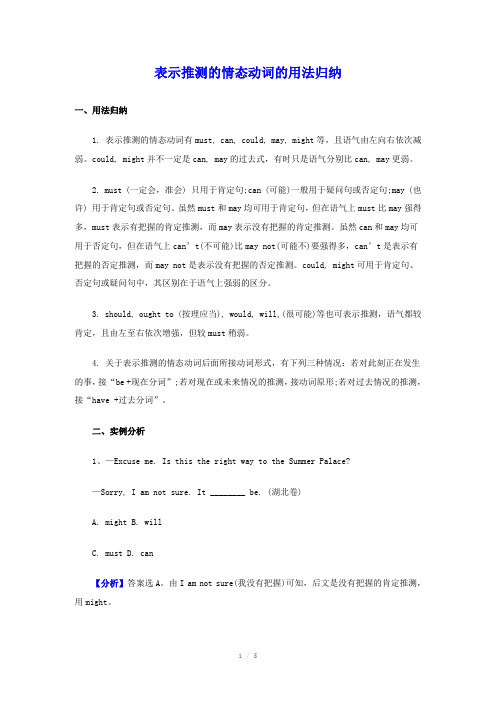
表示推测的情态动词的用法归纳一、用法归纳1. 表示推测的情态动词有must, can, could, may, might等,且语气由左向右依次减弱。
could, might并不一定是can, may的过去式,有时只是语气分别比can, may更弱。
2. must (一定会,准会) 只用于肯定句;can (可能)一般用于疑问句或否定句;may (也许) 用于肯定句或否定句。
虽然must和may均可用于肯定句,但在语气上must比may强得多,must表示有把握的肯定推测,而may表示没有把握的肯定推测。
虽然can和may均可用于否定句,但在语气上can’t(不可能)比may not(可能不)要强得多,can’t是表示有把握的否定推测,而may not是表示没有把握的否定推测。
could, might可用于肯定句、否定句或疑问句中,其区别在于语气上强弱的区分。
3. should, ought to (按理应当), would, will,(很可能)等也可表示推测,语气都较肯定,且由左至右依次增强,但较must稍弱。
4. 关于表示推测的情态动词后面所接动词形式,有下列三种情况:若对此刻正在发生的事,接“be +现在分词”;若对现在或未来情况的推测,接动词原形;若对过去情况的推测,接“have +过去分词”。
二、实例分析1、—Excuse me. Is this the right way to the Summer Palace?—Sorry, I am not sure. It ________ be. (湖北卷)A. mightB. willC. mustD. can【分析】答案选A。
由I am not sure(我没有把握)可知,后文是没有把握的肯定推测,用might。
2、You might just as well tell the manufacturer that male customers ________ not like the design of the furniture. (上海卷)A. mustB. shallC. mayD. need【分析】答案选C。
初三英语中考语法一轮复习讲义(二十六)can, may, must表推测用法最全总结与整理

(你姐姐根本不可能在南京旅游,我刚刚还看见她呢。
)C.它们的推测程度为:may/might表示“有可能;大概”,might的语气比may要弱,相当于perhaps;can/could表示“或许”,其可能性比may/might要小,相当于possibly;must的可能性最强,语气较肯定。
Our football team plays better than before. It could win.(我们的足球队踢得比以前好些,它可能会赢。
)(把握不大)The news could be true.(这消息也许是真的。
)The earrings might be a present for her mother.(这对耳环可能是给她妈妈的礼物。
)I don’t know if I’ll get a gift.I might get it.(我不知道我能否得到一份礼物。
可能会吧。
)She isn’t answering the phone. She must be out.(她没接电话。
她肯定是出去了。
)Each Olympic medal must be at least 3 millimeters thick and 60 millimeters in diameter.(每块奥运奖牌必须至少3毫米厚,直径至少60毫米。
)(2)表示对过去的状态、动作的推测A.当表示对过去的状态、动作的推测时,must/may/might可用在肯定句中表示肯定的推测,一般用must/may/might+have done(现在完成时)表示。
The boy may have got lost. It isn’t easy to find this place.(这个男孩子可能迷路了,这个地方不好找。
)She may have missed the bus.(她也许错过公共汽车了。
)说明:表示推测过去的可能性时,可以用may/might+have+过去分词;但might的可能性比may小些,且might可用could代替。
情态动词mustcancouldmaymight表推测用法
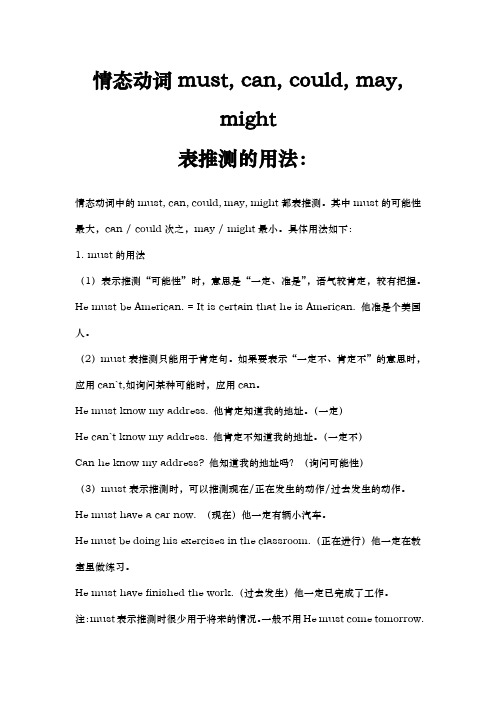
情态动词must, can, could, may,might表推测的用法:情态动词中的must, can, could, may, might都表推测。
其中must的可能性最大,can / could次之,may / might最小。
具体用法如下:1. must的用法(1)表示推测“可能性”时,意思是“一定、准是”,语气较肯定,较有把握。
He must be American. = It is certain that he is American. 他准是个美国人。
(2)must表推测只能用于肯定句。
如果要表示“一定不、肯定不”的意思时,应用can`t,如询问某种可能时,应用can。
He must know my address. 他肯定知道我的地址。
(一定)He can`t know my address. 他肯定不知道我的地址。
(一定不)Can he know my address? 他知道我的地址吗?(询问可能性)(3)must表示推测时,可以推测现在/正在发生的动作/过去发生的动作。
He must have a car now. (现在)他一定有辆小汽车。
He must be doing his exercises in the classroom.(正在进行)他一定在教室里做练习。
He must have finished the work.(过去发生)他一定已完成了工作。
注:must表示推测时很少用于将来的情况。
一般不用He must come tomorrow.可用It`s certain / I`m sure that he will come tomorrow.(4)在反意疑问句中,当附属部分含有表示推测意义的must时,疑问部分的助动词应与must后面的动词在非推测情况下的用法保持一致。
He must be a worker, isn`t he? (现在)他准时个工人,是吗?It must have rained last night, didn`t it? (过去)昨晚一定下雨了,是不是?You must have learned English for many years, haven`t you? (完成时)你一定学了好多年英语,是吗?2. can / could的用法(1)can表示推测“可能性”时,往往用于否定句或疑问句。
高中英语知识点大全31can、may、must表推测的用法

高中英语知识点大全(31):can/may/must表推测的用法1、can/may/must表推测的用法can, may, must等都可用于表推测,但它们的含义和用法不同。
must语气最肯定,指“一定、必定”,只用于肯定句中。
“must+动词原形”表示对现在情况的推测;“must + have + done ”表示对过去情况的推测。
如:Mum must be cooking supper now.妈妈现在一定在做晚饭。
He must have finished his work.他一定完成他的工作了。
May/might 表示“或许,可能”。
如:Tom may go abroad next year.汤姆明年可能要出国。
She might have finished the work.她可能已完成这项工作了。
He can’t know the answer.他不可能知道这个答案。
can/could 表示“可能,会”,我用于否定和疑问句中。
如:Could she he at home?她可能在家吗?can,表示一时的情况,意为“有时侯会……”。
can的这种用法,只用在肯定句中。
如:Children are lovely, but they can be tiring.Training by yourself in a game can be highly dangerous.2、case 用法小结(1)名词case的词意①意为“情形、情况”。
If that’s the case, you’ll have to work much harder.如果是那种情形的话,你将不得不更加努力地工作。
②意为“病例、案例”。
There were seven cases of cholera.有7起霍乱的病例。
The civil case will be heard in court next week. 这一案件将于下星期审理。
巧记must,can,may表示推测时的用法
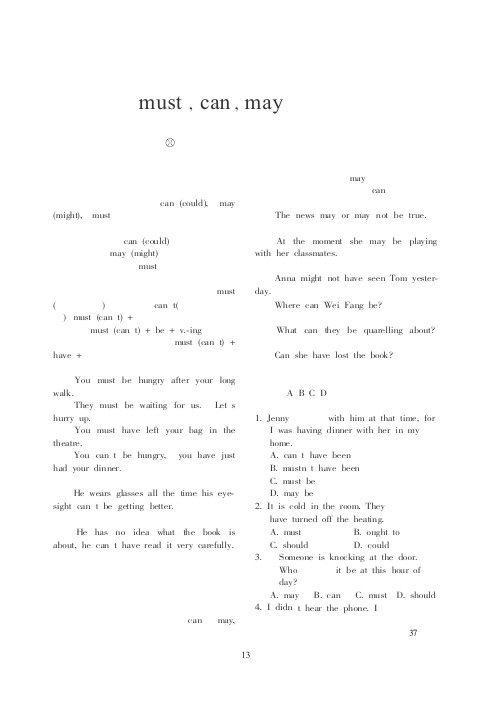
C/"0 !"# 0/4, 34 F&"94’’-#. "3%&0E
他 们可 能在 争吵 些什 么呢 ?
G"# 1/4 /"54 ’%10 0/4 3%%<E
会 丢了 那本 书了 吗?
她也 许
8%& +&10 34 /&#.9, ":049 ,%&9 ’%#. ;"’<6
长途 步行 之后 你一 定是 饿了 。
(下转第37 页)
)*
0& N-$: 262/ ’ * -!.$ ($!* *1 $!*& 3& N-$: -!2 *1 21 !#(1"* $.$9:*-6/? +$=19$ 1*-$9" ’$:$"& M& O1+ 1==$9$2 *-$ (1/$: +$7!)"$ -$ @!/*$2 & ’& *1 "$$ 6= *-$9$ @$9$ !/: %$1%#$ @-1 @1)#2 #6<$ *1 #6.$ 6/ ! 7!?$ ,& *1 "-1@ *-$ %)+#67 -1@ *$996+#$ !/6(!#" ’#6=$ 71)#2 +$ 0& *1 (!<$ (19$ (1/$: +: %)+#6"-6/? *-$ 9$7192$2 .62$1*!%$" 3& *1 6(%91.$ -1)"6/? 71/26*61/" 1= @19<6/? %$1%#$ #6<$ P967 4& B-67- 1= *-$ =1##1@6/? @1)#2 +$ *-$ +$"* *6*#$ =19 *-6" %!""!?$C ’& P!": B!: *1 P!9/ ! K>4QQ ,& 31 R1* S$$2 *-$ 8)(!/" 0& T6.6/? T6<$ ! 0-67<$/ 3& U$**6/? ’#1/? B$## ’/:@!:
may must can need的用法
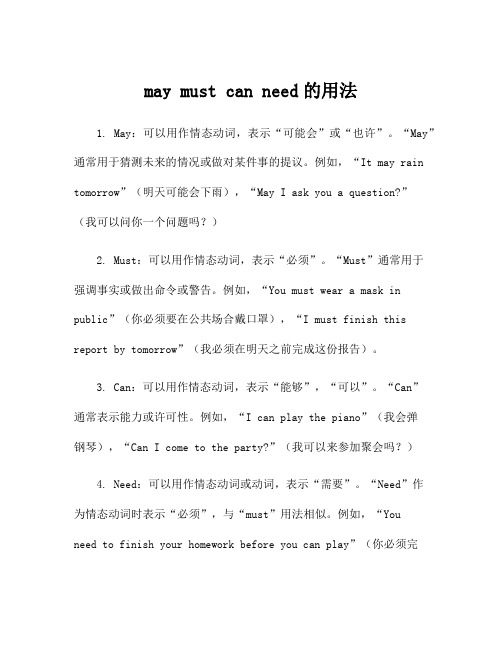
may must can need的用法
1. May:可以用作情态动词,表示“可能会”或“也许”。
“May”通常用于猜测未来的情况或做对某件事的提议。
例如,“It may rain tomorrow”(明天可能会下雨),“May I ask you a question?”
(我可以问你一个问题吗?)
2. Must:可以用作情态动词,表示“必须”。
“Must”通常用于
强调事实或做出命令或警告。
例如,“You must wear a mask in public”(你必须要在公共场合戴口罩),“I must finish this report by tomorrow”(我必须在明天之前完成这份报告)。
3. Can:可以用作情态动词,表示“能够”,“可以”。
“Can”
通常表示能力或许可性。
例如,“I can play the piano”(我会弹
钢琴),“Can I come to the party?”(我可以来参加聚会吗?)
4. Need:可以用作情态动词或动词,表示“需要”。
“Need”作
为情态动词时表示“必须”,与“must”用法相似。
例如,“You
need to finish your homework before you can play”(你必须完
成作业才能玩耍)。
作为动词时,通常表示真正的需求。
例如,“I need help with this project”(我需要帮助完成这个项目)。
[need的用法]can、may、must、need的用法
![[need的用法]can、may、must、need的用法](https://img.taocdn.com/s3/m/7c3e1b0ba200a6c30c22590102020740be1ecd3c.png)
[need的用法]can、may、must、need的用法篇一: can、may、must、need的用法can、may、must、need的用法can①表示能力,“能,会”。
[)Eg : Can you play basketball?②表示怀疑,猜测,常用于否定句或疑问句。
Eg :Li hua can’t be in the classroom.③表示请求,允许,多用于口语,译“可以”= may.Eg: you can go now.④can 开头的疑问句,肯定句,否定句用can或can’t.may①表示推测,“可能,也许”,用于肯定句。
Eg: He may come tomorrow.②表示请求,“许可,可以”。
Eg:May I borrow your book?注:表示请求,许可时,主语为第一人称的一般疑问句,否定回答用mustn’t“不可以,禁止,不许”,不用may not“可能不”。
③表示祝愿。
Eg :May you success.must①表示“必须,应该”。
②表示推测“一定”。
Eg:There is someone knocking at the door.It must be Jim.③否定句中,mustn’t 表示禁止,“不允许”。
④以must 开头的疑问句,肯定句回答用must,否定回答用needn’t , 表示“不需要,不必”=“don’t have to”.⑤表示“偏偏”。
Eg: Must you play the piano at this time.need①情态动词:+do,用need 提问或回答,肯定句回答用must ,否定句回答用needn’t.Eg: Y ou needn’t come to school so early.②实义动词:+to do ,用助动词提问和否定。
③+doing 表示被动。
④needn’t have done 表示没必要做某事但是做了。
- 1、下载文档前请自行甄别文档内容的完整性,平台不提供额外的编辑、内容补充、找答案等附加服务。
- 2、"仅部分预览"的文档,不可在线预览部分如存在完整性等问题,可反馈申请退款(可完整预览的文档不适用该条件!)。
- 3、如文档侵犯您的权益,请联系客服反馈,我们会尽快为您处理(人工客服工作时间:9:00-18:30)。
2. It is cold in the room. They A ___ have turned off the heating.
A. must
B. ought to
C. should
D. could
3. — Someone is knocking at the door. — It A. may ______ be our neighbour. B. can't C. must D. should
(二)否定推测:can't be... 不可能是...
eg: He wears glasses all the time, his eyesight can’t be good. 你不可能饿了,你刚刚吃过晚饭。 eg: You can’t be hungry, you have just had dinner.
D be a policeman. He is much too short. 5. Johnson ____
B. mustn’t
B a thief. I believe her. 6. — My friend ______
A. can't have been B. can't be 7. — Who told you the news?
A
4. I didn’t hear the phone. I ____ B asleep. A. must be A. may B. must have been C. should be D. should have been C. should D. can’t C. musn't be D. may be
(三)不确定推测:may have done... 可能做过...
eg: He may have arrived at school. He is the early bird. Anna昨天可能见过Tom。 eg: Anna may have seen Tom yesterday.
从A、B、C、D四个选项中,选出最佳选项。
eg: You must have left your bag in the theatre. 昨天肯定下过雨了,地面是湿的。 eg: It must have rained last night, the ground is wet.
(二)否定推测:can't have done... 不可能做过...
A with him at that time, 1. Jenny ___
for I was having dinner with her in my home. A. can’t have been C. must have beenБайду номын сангаасB. mustn’t have been D. may have been
must, can, may 表示“推测”的用法
一、对现在的推测 (一)肯定推测:must be... 一定是...
eg: You must be hungry after a long walk. 他们一定正在等我们。让我们快点。 eg: They must be waiting for us. Let’s hurry up.
(三)不确定推测:may be... 可能(不)是...
eg: The news may be true, I'm not sure. 她现在可能正在和她的同学们玩。 eg: At the moment she may be playing with her classmates.
二、对过去的推测 (一)肯定推测:must have done... 一定做过...
eg: He doesn't know that book at all, he can’t have read it very carefully.
他不可能杀了人,因为他那时和我在一起。 eg: He can't have killed the man, because he was with me at that time.
A Mary. — I don’t remember clearly. It ___
— It ___ Mary. She doesn’t know it. A. may have been; can’t be
B. can be; mustn’t be
C. must have been; can’t have been D. may have been; may not be
